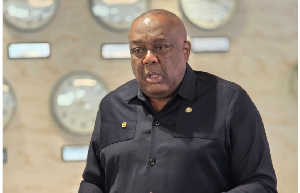Lawra, (U/W), Oct. 10, GNA - Na Puowele Karbo III, Paramount Chief of the Lawra Traditional Area, has expressed worry over the migration of children from the area to the Brong-Ahafo Region and beyond to do menial jobs for money.
He said the migrations were allegedly carried out with the active support and encouragement of parents and guardians. Na Karbo said; "The exodus normally begins immediately after the basic schools vacate in July when it is common to see children as young as 10 years boarding specially hired commercial vehicles at vantage points along most villages within the area."
He said those children were seen with just some few items in black polythene bags being conveyed to unknown destinations for purposes which were unclear to the Traditional Council. The Lawra Na said this at this year's "Kob-Bine" Festival of the chiefs and people of the Lawra Traditional Area in the Upper West Region on Friday, which was witnessed by a government delegation from Burkina Faso. The festival is celebrated annually to thank the Almighty God and ancestors for a successful traditional farming year and the prospects of a bountiful harvest.
It was on the theme: "Kob-Bine - A Tool for Socio-economic Empowerment of Our People". Na Karbo said the practice was a major factor in the high school drop out and failure rate in the area, as well as the unduly exposure of the children to physical and social dangers such as accidents, armed robbery, drug abuse, prostitution and HIV/AIDS. He said 16 of such children, many of whom were from the Lawra Traditional Area, who were returning after their sojourn down south, met their untimely death in a motor accident between Bamboi and Bole recently. He said the phenomenon raised serious issues relating to children's rights and protection in the traditional area. "For instance, we may want to know whether these migrations have the consent of parents and what are the terms and conditions of engagement of such children at their destinations. This requires urgent action," Na Karbo said.
He appealed to the Lawra District Assembly to establish a multi-sectoral team comprising the Traditional Council, the Police, Department of Social Welfare, the GPRTU and other stakeholders to enforce the laws relating to the protection of children to curb the practice.
The Lawra Na called on the government to rehabilitate roads in the traditional area, which, he said, were in deplorable state and hampering the movement of people and goods.
He said the Lawra Traditional Council was poised to provide quality and progressive leadership and create the necessary conditions for the mobilisation of expertise to pursue the development agenda of the area. To this end, the Council would organise a Development Forum at which citizens and relevant stakeholders would take a stock of the development challenges and identify the opportunities and potentials of the area for investments.
Na Karbo said the outcome of the forum would be used as a development framework for the traditional area that would take into account the many government initiatives for the north, including the Youth in Agriculture Programme and the Savanna Accelerated Development Authority (SADA). He said to achieve a balanced, equitable and comprehensive development as well as improved human resource base of the area, the Council would focus on the provision of quality education, youth development, women empowerment and improved and sustainable agricultural development. Na Karbo called on the government and other development partners to support the Council's development efforts to promote the socio-economic development of the people.
The Paga Pe, Charles Awampaga, also the President of the Upper East Regional House of Chiefs, who chaired the function, called for a forum including the chiefs, members of parliament and the youth from the three northern regions to draw a strategic development plan to take advantage of the SADA for the area's development. He urged traditional rulers to regularly interact with the youth to address the potential chieftaincy and land disputes in the communities for peace and stability to prevail.
General News of Saturday, 10 October 2009
Source: GNA












